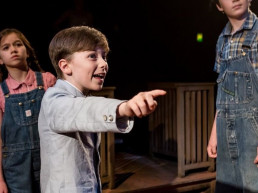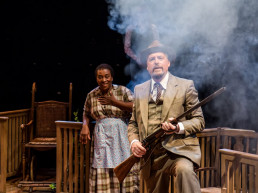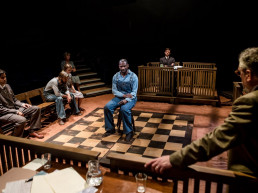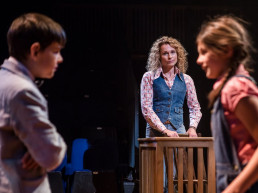I must begin with a confession: I have never read To Kill A Mockingbird. My copy lies in a pile amongst the many other books on my bedside table waiting to be read (such is the life of an English student!).
Yet after seeing Elizabeth Newman’s production of To Kill A Mockingbird at the Bolton Octagon, it soon becomes apparent how imperative Harper Lee’s work truly is, and how effectively Newman and the Bolton Octagon company have brought this work to life.
The play unfolds like a visual memory, narrated by the character of Jean Louise Finch played by Barbara Drennan. Drennan ’s perfect delivery takes us to the town of Maycomb and back to 1935 where we meet her younger self, Scout, her brother Jem and their friend Dill. As they innocently play their games amongst the sandy yards of the neighborhood, a backdrop of the racial hatred and intolerance of the Deep South is gradually revealed.
What is most notable about this production is the impeccable acting ability of the cast. Not unlike a Chekov play, each character is so well “fleshed out”. This can no doubt be due to the skill of Christopher Sergel’s adaptation and of course Harper’s Lee original idea, but also Newman’s ability to draw such truthful performances from each cast member. At no point do you doubt the thought behind even the smallest mannerism. The commitment of Leila Mimmack’s performance of Mayella Ewell cannot go unnoticed (her character’s painful inability to speak the truth manifests itself as an angry jaw grinding). The slow pace of life is reflected in a simple walk or gesture, and the accents of the Deep South transport us from Bolton for a few hours. Rob Edwards’s exemplary interpretation of Atticus Finch allows us easily forget to make comparison to Gregory Peck’s Academy Award winning film performance. This is surely no mean feat. As audience members we are drawn in as jury, where Atticus’s eyes can meet our own in this intimate space, as we are asked to consider his closing argument. Marc Small’s Tom Robinson is performed with a sad honesty — a personification of the Mockingbird to be protected.
Barbara Drennan’s ability to stand amongst the action like a ghost, unseen, watching, and reflecting creates a truly ethereal atmosphere. And of course, one cannot mention the acting without commenting on the exceptional performances of all the children in the cast. Jasmine De Goede (Scout) will be one to watch out for no doubt.
The faultless design not only uses the space to effect (with the duality of Maycomb’s resident’s porches doubling later in the play as courtroom docks) but also works to create the atmosphere of a summer from many years ago. Between scenes, the actors in costume remove and replace their own set, which not only has a practical advantage but also a clever device in portraying the passage of time. It also suggests, as Elizabeth Newman has indicated, a company ethos that no hierarchy exists here.
The play’s central theme of the racial inequality of the past unfortunately reflects a sad relevance to our present day. Only two days ago in Charlotte, North Carolina, a state of emergency was declared due to angry and violent protest in reaction to yet another US police shooting of an unarmed black person. Considering recent events and even the necessary existence of movements such as “Black Lives Matter” — can we really say we have moved on? In the word’s of Atticus Finch “We are all equal”. These words are not just a lesson for Scout, but a resounding lesson for us all. I opened my copy of this masterpiece and began to read.
Michelle Hughes
Michelle is a first-year English BA (Hons) student at the University of Bolton.





